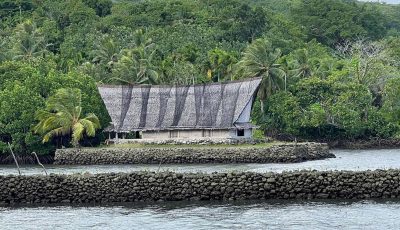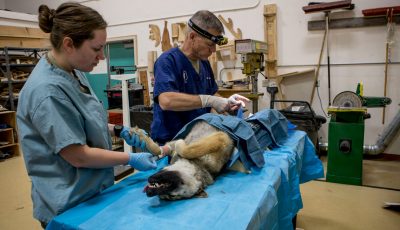Aging Center gets approval of CNMI State Plan
At the helm, marking major accomplishments, director Walter Manglona has for the first time in over 20 years at the Office on Aging, under the Department of Community and Cultural Affairs, ensured the well-being of the islands’ man’amko after successfully completing and certifying the 2015 National Aging Program Information System (NAPIS) State Program Report.
According to Manglona, the four-year CNMI State Plan on Aging he had authored had also been approved, adding that the approval is an essential accomplishment in addition to the Senior Community Service Employment Program grant modification and the SCSEP grant application approvals for the well-being of the elderly.
Since becoming director, the Office on Aging has been certified three years in a row with the National Aging Program Information System, he says.
“The National Association of State Units on Aging (NASUA), with funding from the Administration on Aging (AoA) under the Administration for Community Living (ACL), has engaged Synergy Software Technologies Inc. to develop a software reporting structure for the State Program Report (SPR) section of the National Aging Program Information System (NAPIS). For the first time in over 20 years the CNMI Office on Aging was able to accomplish this,” he said.
In an email from state liaison for the CNMI under the Administration for Community Living of the U.S. Department of Health and Human Services, Anna Cwirko-Godycki lauded Manglona’s efforts and dedication on maintaining NAPIS standards and requirements.
“I appreciate our conference calls and collaboration during this time. You have moved the program forward. I enjoy working with you, trust you, and I am willing to provide as much technical assistance as I can. One example of your success is that for 20 years we have tried to obtain a report via our NAPIS system from the Office on Aging and we were pleasantly surprised when you were able to submit an online NAPIS report with CNMI data,” she said.
Since his appointment as director in 2013, the agency has seen an increase in client participation at the Saipan, Tinian, and Rota centers.
“We have increased our list of activities and services to our elders at the Senior Centers [including] more health programs (BP/H1C checkups) and nutritional education to keep our man’amko healthy and strong,” he said.
According to the Office on Aging’s Action Plan for 2016, the agency’s ultimate vision is for the elderly and people with disabilities to have the opportunity to fully participate in all aspects of society and community life and be continuously productive, be able to maintain their health and independence for as long as time allows, and remain in their own homes and communities for as long as possible without the isolation of life in institutions such as nursing homes.
With this vision, director Manglona and Office on Aging staff over the past year have conducted outreach assessment to homebound clients and caregivers to update information and receive feedback, as well as inform clients of the programs and services available at the center, including respite care and legal assistance.
Manglona adds that the CNMI SCSEP officially inputted its first participant in unsubsidized employment at the Rota Mayor’s Office within the past year as well as successfully completing the 2015 CNMI SCSEP State Plan Modification and Corrective Action Plan, which was approved on March 28, 2015.
The AoA also solidified its prevention of abuse, neglect and exploitation program while the CNMI Office on Aging under the Title VII program provides funding for an attorney from the Office of the CNMI Attorney General to meet directly with the elderly registered in the program and to provide them with legal advice and assistance in legal matters.
Manglona shares that the Caregiver/Respite Care Program, through funding from the National Family Caregiver Service Program, is able to assist family members caring for individuals who are 60 years of age and older by providing respite care to all eligible caregivers.
“This program ensures that those family members and other caregivers supporting older individuals are able to provide adequate services to those in need. The Office on Aging provides respite care to alleviate stress and prevent burn out, each registered caregiver can avail to this program once a month. The service is provided by the Marianas Visiting Nurses,” he said.
In addition to the many programs, Manglona adds that “in order to improve services, we began an outreach program in which Office on Aging staff conduct regular visits to homebound clients and caregivers to request feedback on services and hear any complaints and/or suggestions. This was also an opportunity for staff to watch for any signs of possible elder abuse and/or neglect… [and provide] health screening, exercise/health promotion programs, and transportation services for errands. In addition to their daily activities, clients can now enjoy karaoke, basketball, yoga, ukulele class, art class, bowling, dance class, ground golf, and water therapy…”
He noted that on Rota, beautification projects for the center commenced with Rota Municipal Council, Department of Public Work and Commonwealth Ports Authority providing assistance.
On Tinian, the agency completed a structure to hold five tanks of propane gas for the Tinian Aging kitchen. Materials for construction were donated by the previous Tinian Municipal Council with Mayor Joey P. San Nicolas assigning six personnel to the Tinian Office on Aging for two assistant cooks, two man’amko assistants, one bus driver and one maintenance worker.
Over the last couple of years, the agency served thousands of meals to active congregants and the homebound elderly. Currently, the Saipan Aging Center serves 91 active congregates 213 homebound elderly and 172 caregivers. The Tinian Center serves 21 congregates, 36 homebound elderly, and 18 caregivers and Rota serves 35 homebound, 38 congregates and 15 caregivers.
Manglona illustrates that despite the state of disaster brought upon by Typhoon Soudelor, the center’s restoration and ensuring the well-being of the community’s elderly continues.
Gov. Ralph DLG Torres expressed that the presence, guidance and direction provided by the agency and the man’amko in the community is invaluable.
“As a community we must take those lessons of compassion and care, we must strengthen our value for wisdom and respect and advocate for the well-being of our man’amko,” he said.
The Office on Aging, through its various programs and supports has pro-actively implemented a wide range of functions relative to planning and advocacy that have assisted man’amko to lead meaningful and dignified lives.
The Office on Aging was made possible through the Older Americans Act in 1974 with the CNMI Office on Aging tasked to serve and provide needed assistance to all senior citizens and caregivers by administering programs and activities promoting independent living, building self-esteem, and providing opportunities for seniors to play an active role in the community.
For more information on the Office on Aging, contact (670) 233-1321/2.



























